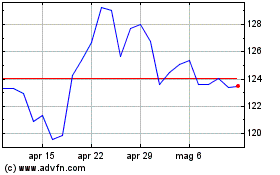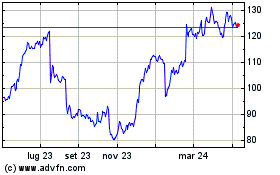Credit cards are so 2006. Today the fast-growing way for
consumers to pay is the prepaid card.
This kind of plastic, traditionally a bastion of gift cards, is
also being used by federal and state governments to pay out
benefits, and by companies to pay their employees.
Use of prepaid cards has also risen with the economic slump, as
budget-conscious consumers shun debt. Companies including
MasterCard Inc. (MA), Visa Inc. (V), JPMorgan Chase & Co.
(JPM), Bank of America Corp. (BAC), Citigroup Inc. (C), Discover
Financial Services Inc. (DFS) and American Express Co. (AXP), are
plowing millions in investments into this area.
"Financial institutions are restricted in what they can do with
credit" by new legislation, says Tim Sloane, director of prepaid
advisory service at Mercator Advisory Group, a market research
firm. "If they want to continue to service the market, they have to
find a way to introduce prepaid services to fill the gap."
The market for prepaid cards grew to $247.7 billion in 2008 from
$220.3 billion in 2007, according to Mercator. Prepaid cards,
unlike credit cards that have balances that can be carried
month-to-month, work like debit cards, with funds immediately
deducted from an existing balance. But unlike debit cards, which
are linked to a checking account, prepaid cards may not be linked
to a bank account.
Prepaid cards are less profitable than credit cards, but
companies earn income from processing transactions and fees related
to the activation and maintenance of these cards. So the more
swipes and amounts spent using prepaid cards, the more the income
that's generated.
For companies jumping on the prepaid bandwagon, its appeal lies
in the number of ways it may be used. For instance, aside from gift
cards, they are used by consumers to teach their teenager fiscal
responsibility, and by those without bank accounts. In this
economic environment, prepaid cards are also increasingly used as a
means to budget and avoid debt. In addition, more consumers are
turning to this type of plastic as banks rein in credit lines amid
losses from credit-card loans and stricter legislation.
"Prepaid is much more responsible," says Dan Horne, a marketing
professor at Providence College, and its popularity is rising
because of the "sudden negative perception of credit."
A Big User: Uncle Sam
A big driver of growth in prepaid is the public sector. Federal
and state organizations, under increasing pressure to cut costs,
are replacing costlier checks with prepaid cards to pay out
unemployment benefits, food stamps and Social Security. The total
load placed on prepaid cards across all government segments was
$69.02 billion in 2008, up 11.5% from 2007, according to
Mercator.
"For card issuers, prepaid opens up a new customer base for
them," says Michael Flores, president of Bretton Woods Inc., a
consulting firm.
Visa runs 70 state prepaid programs in 38 states, including
Texas, California and Alaska, to distribute child-support payments,
workers' compensation and unemployment insurance.
"Without question, prepaid cards have assumed more significance
in this environment," says Elizabeth Buse, global head of products
at Visa.
Laura Kelly, head of global prepaid business at MasterCard, says
spend volume on prepaid cards in the public sector will total $284
billion by 2015, according to a 2008 study commissioned by the
company. MasterCard works with the U.S. Treasury for social
security payments on prepaid cards. This prepaid option for Social
Security could potentially save taxpayers about $44 million each
year, according to government estimates.
"Over the last two years, prepaid cards have picked up
dramatically because of government's stimulus programs," says Paul
Simpson, product head of global transaction services at Citigroup.
As of the third quarter, Citigroup had 14 million prepaid cards
globally under programs run for about 1400 clients, comprising
governments and companies.
"Prepaid cards offer great clarity to the government on where
the dollars are being disbursed," says Kevin Phalen, head of
commercial cards at Bank of America.
Prepaid cards are popular with companies, too, where they are
used, for instance, to pay employees and consumer rebates.
"We are investing heavily in the prepaid business," says David
Josephs, managing director of J.P. Morgan Chase's prepaid card
business. The company provides prepaid services to over a 1,000
companies, servicing about 10 million prepaid cards with nearly $2
billion in financial transactions settled monthly.
-By Aparajita Saha-Bubna, Dow Jones Newswires; 617-654-6729;
aparajita.saha-bubna@dowjones.com
Grafico Azioni Discover Financial Servi... (NYSE:DFS)
Storico
Da Giu 2024 a Lug 2024

Grafico Azioni Discover Financial Servi... (NYSE:DFS)
Storico
Da Lug 2023 a Lug 2024
